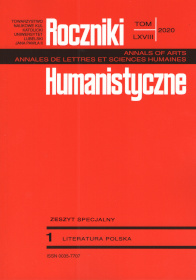„Przez płytką rzekę historii”. Jan Paweł II i wątki oświeceniowe
Abstrakt
Artykuł składa się z czterech cząstek poświęconych różnym okolicznościom, w jakich Jan Paweł II ujawniał swoje zainteresowanie literaturą i szerzej – kulturą XVIII wieku. W części pierwszej analizie poddano fragment wystąpienia Papieża w polskim parlamencie w dniu 11 czerwca 1999 roku. Jan Paweł II przywołał wówczas ideę Konstytucji 3 Maja i przytaczając hasła związane z jej uchwaleniem oraz z powrotem do Polski gen. Jana Henryka Dąbrowskiego, dokonał aktualizacji przesłania, tak ważnego dla polskiej świadomości. W części drugiej analizie poddano te fragmenty książki Pamięć i tożsamość, w których Jan Paweł II mówi o roli oświecenia w europejskiej historii nowożytnej i o niejednoznacznym dziedzictwie oświecenia w XX wieku. W części trzeciej przywołano kilka uwag Papieża na temat wartościowania dzieł literackich – znów nawiązując do tomu Pamięć i tożsamość. Jan Paweł II wydawał się szczególnie cenić takie ich cechy, jak artystyczna doskonałość, dzieło literackie jako świadectwo życia, wreszcie głębokie, bezkompromisowe zaangażowanie Autora w wierze. W części czwartej wskazano te utwory, powstałe w wieku XVIII, które były lub z dużą dozą prawdopodobieństwa mogły być przedmiotem zainteresowania i akceptacji Jana Pawła II – z uwagi na jego preferencje, wybory i literackie zainteresowania.
Bibliografia
Basara-Lipiec, Eugenia. Arcydzieło: teoria i rzeczywistość. Instytut Kultury, 1997.
Benisławska, Konstancja. Pieśni sobie śpiewane. Przygotował do druku Tadeusz Brajerski i Jerzy Starnawski, Komisja Badań nad Literaturą Katolicką, t. 1, TN KUL, 1958.
Benisławska, Konstancja. Pieśni sobie śpiewane. Wydał Tomasz Chachulski, Biblioteka Pisarzy Polskiego Oświecenia, t. 2, Wydawnictwo IBL, 2000.
Borowy, Wacław. „Konstancja Benisławska”. Wacław Borowy. O poezji polskiej w wieku XVIII, PIW, 1978, ss. 189–208.
Borowy, Wacław. O poezji polskiej w wieku XVIII. PIW, 1978.
Butterwick-Pawlikowski, Richard. „Między oświeceniem a katolicyzmem, czyli o katolickim oświeceniu i oświeconym katolicyzmie”. Wiek Oświecenia, 30, 2014, ss. 11–55.
Kostkiewiczowa, Teresa. Polski wiek świateł. Obszary swoistości. Wydawnictwo Uniwersytetu Wrocławskiego, 2002.
Miłosz, Czesław. Historia literatury polskiej do roku 1939. Przeł. Maria Tarnowska, Znak, 1993.
Oświecenie dzisiaj. Rozmowy w Castel Gandolfo. Przygotował i przedmową opatrzył Krzysztof Michalski, Znak, 1999.
Sławiński, Janusz. „Arcydzieło”. Słownik terminów literackich, red. Janusz Sławiński, Zakład Narodowy im. Ossolińskich – Wydawnictwo, 1988, s. 43.
Spaemann, Robert. „Wewnętrzna sprzeczność oświecenia. Głos w dyskusji”. Przeł. Małgorzata Łukasiewicz. Oświecenie dzisiaj. Rozmowy w Castel Gandolfo. Przygotował i przedmową opatrzył Krzysztof Michalski, Znak, 1999.
Zatajony artysta. O Wacławie Borowym 1890–1950. Wybór szkiców i wspomnień Andrzej Biernacki, „Mistrzowie”, t. 3, TN KUL, 2005.
Zgorzelski, Czesław. „W Tobie jest światłość”. Szkice o liryce religijnej Oświecenia i romantyzmu. TN KUL, 1993.
Copyright (c) 2020 Roczniki Humanistyczne

Utwór dostępny jest na licencji Creative Commons Uznanie autorstwa – Użycie niekomercyjne – Bez utworów zależnych 4.0 Międzynarodowe.





